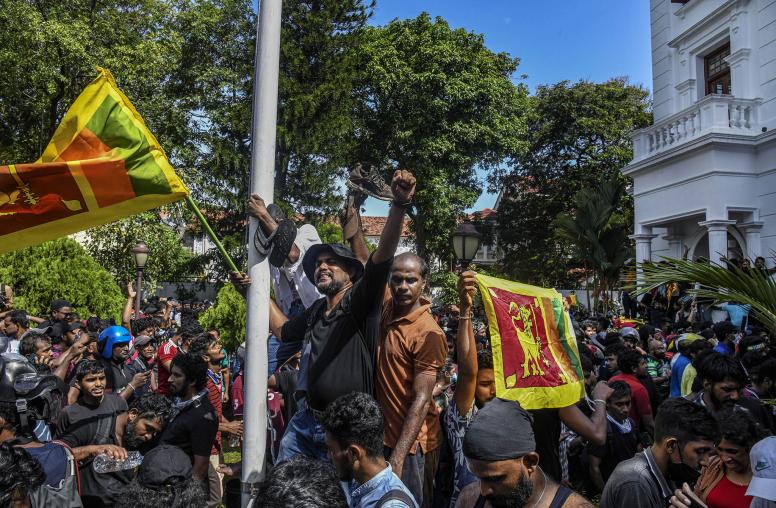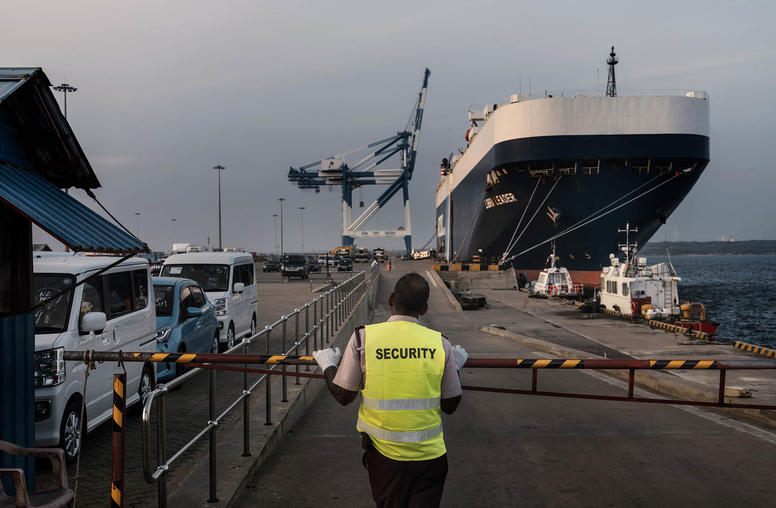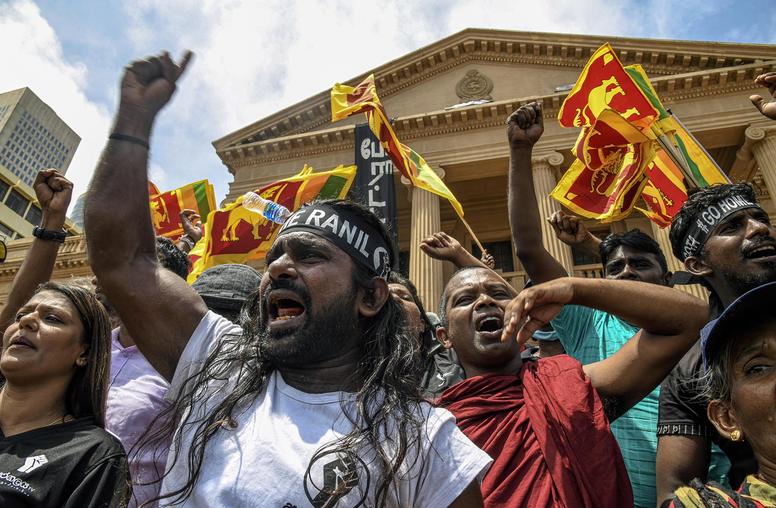Tamanna Salikuddin on the Crisis in Sri Lanka
Despite loosening former President Gotabaya Rajapaksa family's powerful grip on Sri Lankan politics, there's still "a crisis of legitimacy in the country, where people see the leadership can’t deliver" on issues like reconciliation, political reform and addressing the devastating economic crisis, says USIP's Tamanna Salikuddin.
U.S. Institute of Peace experts discuss the latest foreign policy issues from around the world in On Peace, a brief weekly collaboration with SiriusXM's POTUS Channel 124.
Transcript
Julie Mason: Tamanna Salikuddin is director of South Asia programs at the U.S. Institute of Peace. She oversees the organization's work in Pakistan and broader South Asia. Here to discuss what is going on in Sri Lanka. Tamanna, good morning.
Tamanna Salikuddin: Good morning.
Julie Mason: We cannot forget those indelible images of protesters diving into the swimming pool at the president's house. I think that was like the best image of what's happening, but there's so much more to it. Walk us through it.
Tamanna Salikuddin: Yeah, I mean, it's remarkable. After months of political and economic turmoil, you've seen a largely nonviolent and leaderless people's protest in Sri Lanka and they scored a major win earlier in July with the resignation of President Gotabaya Rajapaksa. But even after they got the president out of power, you know, the parliament, which was aligned with the Rajapaksas, has chosen longtime politician Ranil Wickremesinghe as the new president. And so, we're still in a place where there's political turmoil. The cabinet and parliament are still dominated by the Rajapaksa allies that really came to power on a right-wing, Sinhalese Buddhist populist platform. And they're really largely blamed for this terrible mismanagement that has led to an economic crisis.
Julie Mason: So, they got rid of the president, but they just basically installed a duplicate.
Tamanna Salikuddin: Exactly. I mean, the parliament hasn't changed, and the parliament picked a president, a new president, right? And as a longtime politician, he's promised to get them through. You know, just over the weekend, he said, I'll bring the stability that we need to turn the economic corner, but they have real, real economic problems. I mean, earlier this year in April, they defaulted, Sri Lanka defaulted on 51 billion dollars of foreign debt. And they have yet to secure an IMF program. It's a real message for other countries in a post-pandemic world. It's a wakeup call. Several similarly placed countries in both Asia and Africa that have this huge level of foreign debt, and you know, terrible inflation. Sri Lanka was a middle-income country, people aren't used to this, but there's something like 90 percent food inflation. People can't buy food, people can't buy fuel, people can't buy cooking gas. I mean, so it's really bad. But the new president, Wickremesinghe, says it will be months before the average Sri Lankan actually sees real improvement in the economy. They're hoping to sign an IMF deal soon. It will probably be a couple of months, but they also need to restart talks with several of their lenders, including big countries like Japan, China and India. So, I think people are really waiting to see if they can pull themselves out of the depth of this economic crisis.
Julie Mason: The World Bank, also, has ditched Sri Lanka.
Tamanna Salikuddin: Yeah, I mean, it is bad. You know, this economic problem didn't start just yesterday it's a long time coming. But you can see in the last five years, I mean, they have two problems, right. They have heavily borrowed, so they borrow to build vanity projects. They're accused of cronyism, they borrowed to fund the civil war in Sri Lanka and they built a lot of like fancy infrastructure that didn't give them a lot of returns – the famous Hambanthota port that people hear about. But at the same time, the export things that would bring them money into the country – tourism, tea, textiles, remittances – all were hit by a lot of other shocks, like the pandemic, obviously, the war in Ukraine. But some of these are, you know, internally inflicted shocks. So, the Rajapaksas imposed organic farming overnight, which cut the tea production. You know, in 2019, they slashed taxes for all their supporters. So, there's very little money in the bank for the government. And then, they had Easter bombings, the pandemic, all these things, which really cut tourism. So, you know...
Julie Mason: Wait, wait, hold on, because I don't know much about those Easter bombings from 2019. What happened?
Tamanna Salikuddin: So, in 2019, a Sri Lankan group that's affiliated with ISIS, or ISIS claims affiliation, bombed churches on Easter Sunday and then a series of hotels. And this has really, obviously after that, tourism, which Sri Lanka is very dependent on, completely stopped in a certain way, but at the same time, it just reinforced and exacerbated the already existing tensions between the minority communities and the majority Sinhalese Buddhist community in Sri Lanka. You're coming out of 30 years almost of civil war where really, by the end, the Rajapaksas and the majority community suppressed the Tamil Hindu minority, the Muslim minority, and to a certain extent, even the Catholic, Christian minority. These bombings just exacerbated those tensions, they really put pressure on the small Muslim minority within Sri Lanka. And you follow that up with a pandemic, where these tensions even got worse. So, that is, you know, another cause of the political crisis. There's a crisis of legitimacy in the country where people see that the leadership can't deliver on reconciliation between communities, it can't deliver on political change, constitutional reform, and it really can't deliver on the economy.
Julie Mason: Wow. I mean, it seems like such a warning sign for other countries that are experiencing, you know, perhaps corrupt governments combined with very bad economic conditions, unrest among the people, that everything can blow up. And as you write, Tamanna, like, there's no easy quick fix for this. This is going to be a long time putting this back together. And who knows how many presidents they may lose?
Tamanna Salikuddin: That's right. It's going to be a long slug. I mean, the average Sri Lankan is going to lose patience. I think, already they don't see their president as very legitimate. He had earlier promised, you know, elections or a unity government. He hasn't done that. Now, if he can really actually hold it together to get an IMF loan and get some relief from his creditors, he might get some respite. But you're absolutely right, Julie. This is, other countries, I mean just in South Asia alone, you're seeing Pakistan, Bangladesh, other countries going to the IMF. For decades, you've seen populist, you know, populist leaders who worked on this majoritarian sort of, you know, blame the minorities. But what they did was they spent a lot of money and they didn't have that money. They borrowed it. Now you have all these crises that make it much harder to pay back.
Julie Mason: So, the U.S. is sending, what $32 million? It's not much.
Tamanna Salikuddin: They are. It's not much, but they are talking about a larger plan. I think the important thing will be the U.S., and its allies Japan and India and also, to a certain extent, Australia. These are some of the largest creditors. The U.S. has a lot of influence, obviously, at the IMF. It is going to be about restructuring the debt. It's, you know, obviously, in the immediate term, India and other countries that the U.S. is allied with are bringing aid, but the real solution here is fixing their debt problem and their creditors. If they can put it on a payment plan, so your viewers or your listeners can understand, they need to get on a good payment plan that they can handle. They need to cut their spending and increase their exports. So, you know, those things, the things that Sri Lanka gets money for – tourism, tea, textiles, and remittances – those have to start again. I think the war in Ukraine has made it harder for a lot of similarly placed countries in terms of food insecurity, importing wheat and other things. We're hoping, we just saw wheat leave Ukraine finally. That may be some relief. Sri Lanka has started to cut its spending and try to start its exports again. So, we may see some modest relief in the next few months.
Julie Mason: And Tamanna, before I let you go, why is it in the U.S. interest to help Sri Lanka? What’s our strategic interest there?
Tamanna Salikuddin: Yeah, obviously, this is an important location geo-strategically in the Indo-Pacific, and the Indo-Pacific is the real focus of the U.S. administration, but the real work here is China, right? Sri Lanka is held up as an example of Chinese debt financing, the debt trap. I think it's more complicated than that, you know, China does hold a significant portion of their debt, both bilaterally and also Chinese banks, but a lot of other people, including Japan, and India, hold their debt. So, this is, you know, a good place to show that the U.S. and its allies, the Quad countries let's say, can come to your rescue, can help you, unlike the Chinese. I mean, it's remarkable that the Chinese actually haven't offered really any relief for the Sri Lankans. Whereas you see other countries, the U.S. included, that are coming in and trying to save this country.
Julie Mason: Tamanna. Thank you so much for joining me this morning.
Tamanna Salikuddin: Thanks so much.



